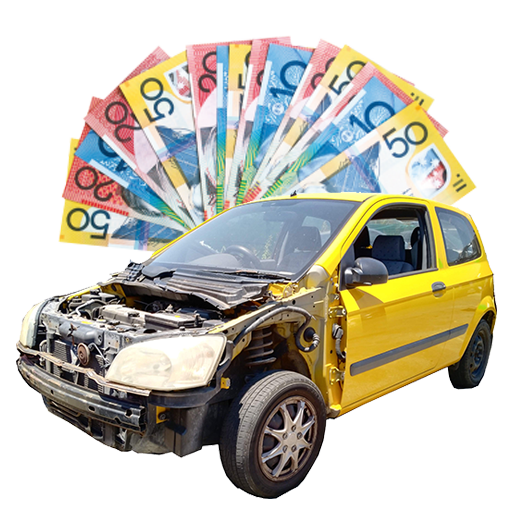When you decide to find an auto recycle near me, you're making one of the best choices for a car that’s reached the end of the road. It’s about more than just clearing your driveway and getting a bit of cash in your pocket. This is a genuinely impactful environmental decision that also happens to support local Aussie businesses and our circular economy.
Why Local Car Recycling Is a Smart Move
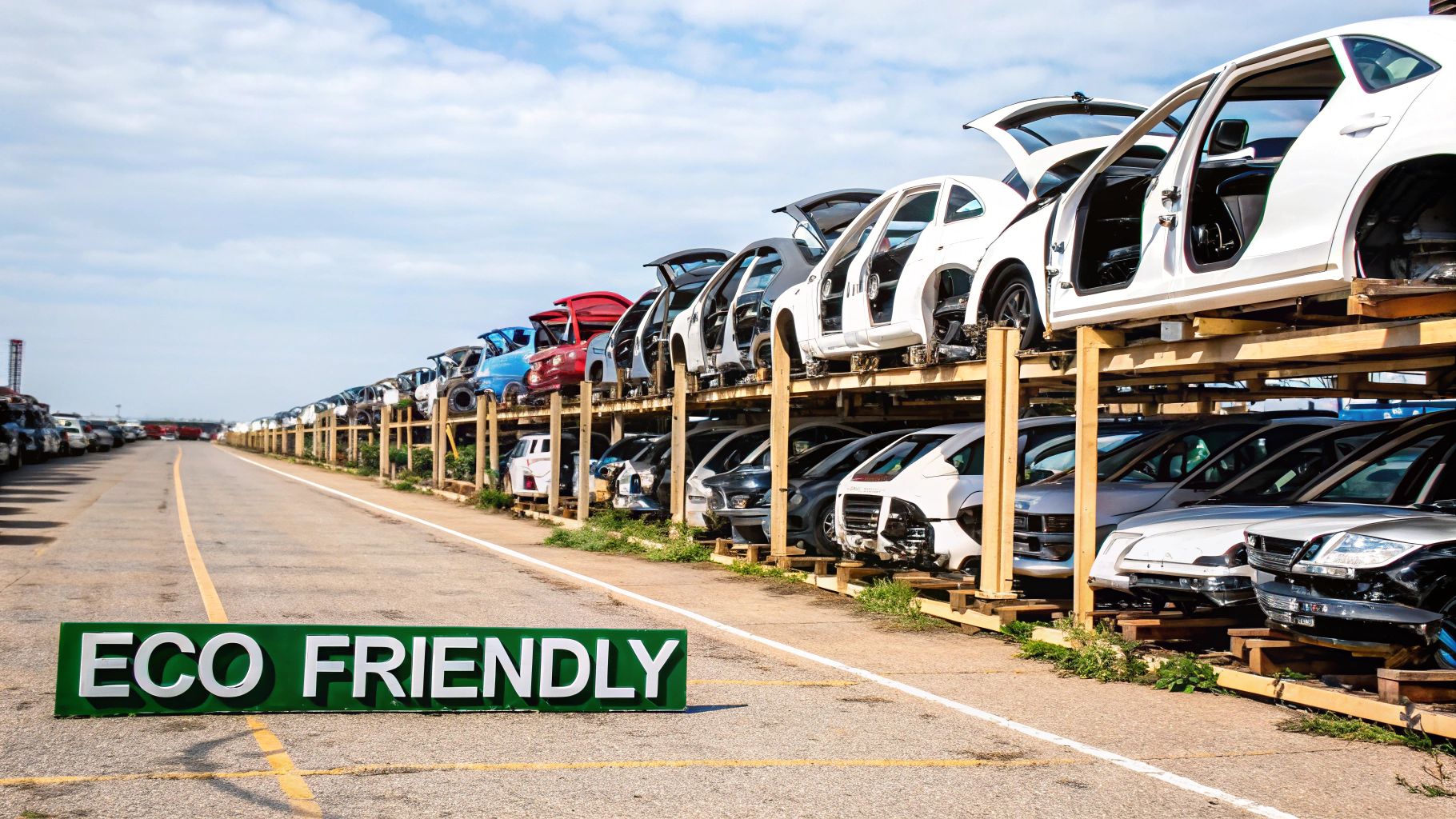
Before you even start Googling for recyclers, it helps to understand the "why." Knowing the real value locked inside that old car sitting in your driveway can change the whole process from a chore into something you can feel good about.
The Environmental Impact of Your Choice
A car that's no longer running is full of hazardous materials. If it's just left to rust away in a paddock or, worse, ends up in a landfill, those toxic substances can do some serious damage.
- Fluid Contamination: Think about it—engine oil, coolant, brake fluid, and leftover petrol can all leak out. They seep into the ground, polluting the soil and eventually our local waterways.
- Heavy Metals: The car battery alone contains lead and acid, both incredibly toxic if they aren't handled by someone who knows what they're doing.
Choosing a proper auto recycler means you're guaranteeing these materials are drained and managed safely, following strict environmental rules. That one simple decision prevents long-term harm to our local ecosystems.
By recycling your car, you're not just disposing of waste; you're actively preventing pollution and protecting the health of your community's natural resources.
Conserving Energy and Raw Materials
Making a brand-new car is a massive undertaking. It consumes a huge amount of energy and requires tonnes of freshly mined raw materials. Recycling completely flips that on its head.
Reusing the steel from just a single car, for example, saves enough energy to power an average Aussie home for almost a year. And the benefits keep stacking up. Recycling metals like steel and aluminium slashes greenhouse gas emissions compared to making them from scratch. Your old car gets a new life, reducing our country's dependence on finite resources.
Supporting a Local and National Effort
Here in Australia, the auto recycling industry is a cornerstone of our economy, made up mostly of small and medium-sized local businesses. Each year, roughly 850,000 vehicles are retired, creating about 1.36 million tonnes of waste.
While we already recycle around 70% of that material, industry leaders are pushing hard to improve those numbers. You can learn more about the broader national car recycling initiatives to see how your choice fits into the bigger picture. When you go with a local recycler, you're helping to keep jobs and money right here in your own community.
How to Prepare Your Car for Recycling
Getting your car ready for its final journey is surprisingly straightforward, but a little prep work can make a huge difference. It’s not a complicated job, but taking care of a few key things will guarantee a smooth handover and save you from any headaches down the track.
First up, you'll want to give the car a thorough clean-out. I mean everything. Check the glove box, rifle under the seats, and don't forget the boot and any sneaky side compartments. You’d be surprised what people leave behind—old sunnies, important papers, even a forgotten stash of coins. Once that tow truck leaves, those items are gone for good.
Sorting Out Your Plates and Paperwork
Next, let's talk about the number plates. In nearly every Australian state, it’s on you to remove the plates before the car is collected. This isn't just a suggestion; it's a critical step in the process of officially deregistering the vehicle.
With plates in hand, your next task is to head to your state's transport authority, either online or in person. You need to formally apply to cancel the registration. This is the official step that cuts your legal connection to the car, which is vital for protecting yourself from any future tolls or fines that might be linked to it.
A Pro Tip: Wait until after the car has been picked up to cancel the registration. The recycler will give you a disposal certificate or receipt, and your local transport authority might need to see this as proof before they finalise the cancellation.
What About Draining the Fluids?
I get this question all the time: "Should I drain the oil, petrol, or coolant myself?" The short answer is almost always no. Any reputable auto recycler is fully equipped to handle these hazardous fluids. They have the right tools and follow strict procedures to do it safely and without harming the environment.
Trying to drain them yourself can get messy fast, leading to spills that are a real pain to clean up and bad for the environment. It's a job best left to the professionals. Just have a quick chat with your chosen recycler to confirm they’ll handle the entire depollution process.
To give you a better idea of what happens after your car is towed away, take a look at the journey it goes on.
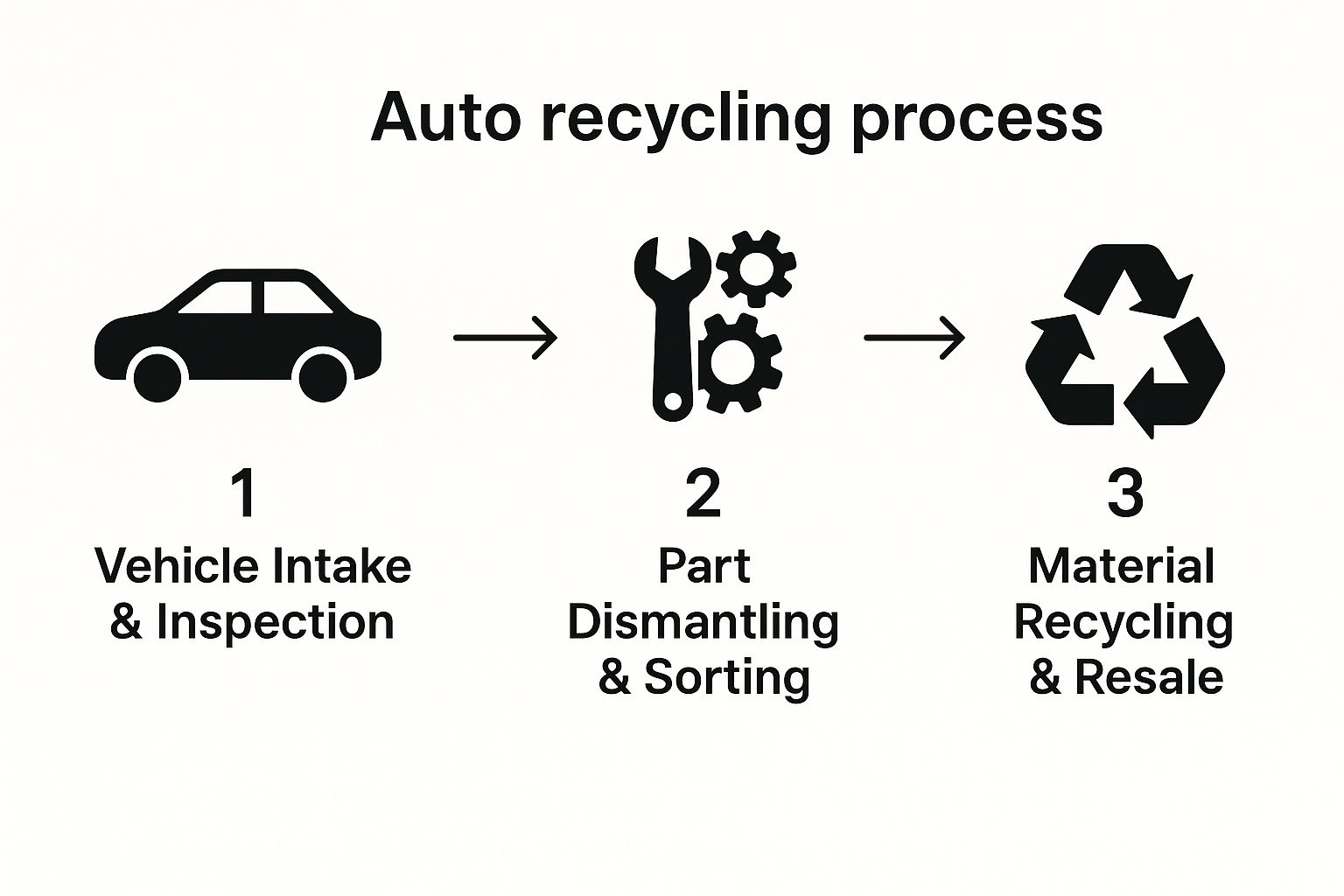
As you can see, a professional recycler systematically breaks down the vehicle to recover as much as possible. By following these simple prep steps, you're helping to kick off this efficient and eco-friendly cycle on the right foot.
Finding a Reputable Australian Auto Recycler
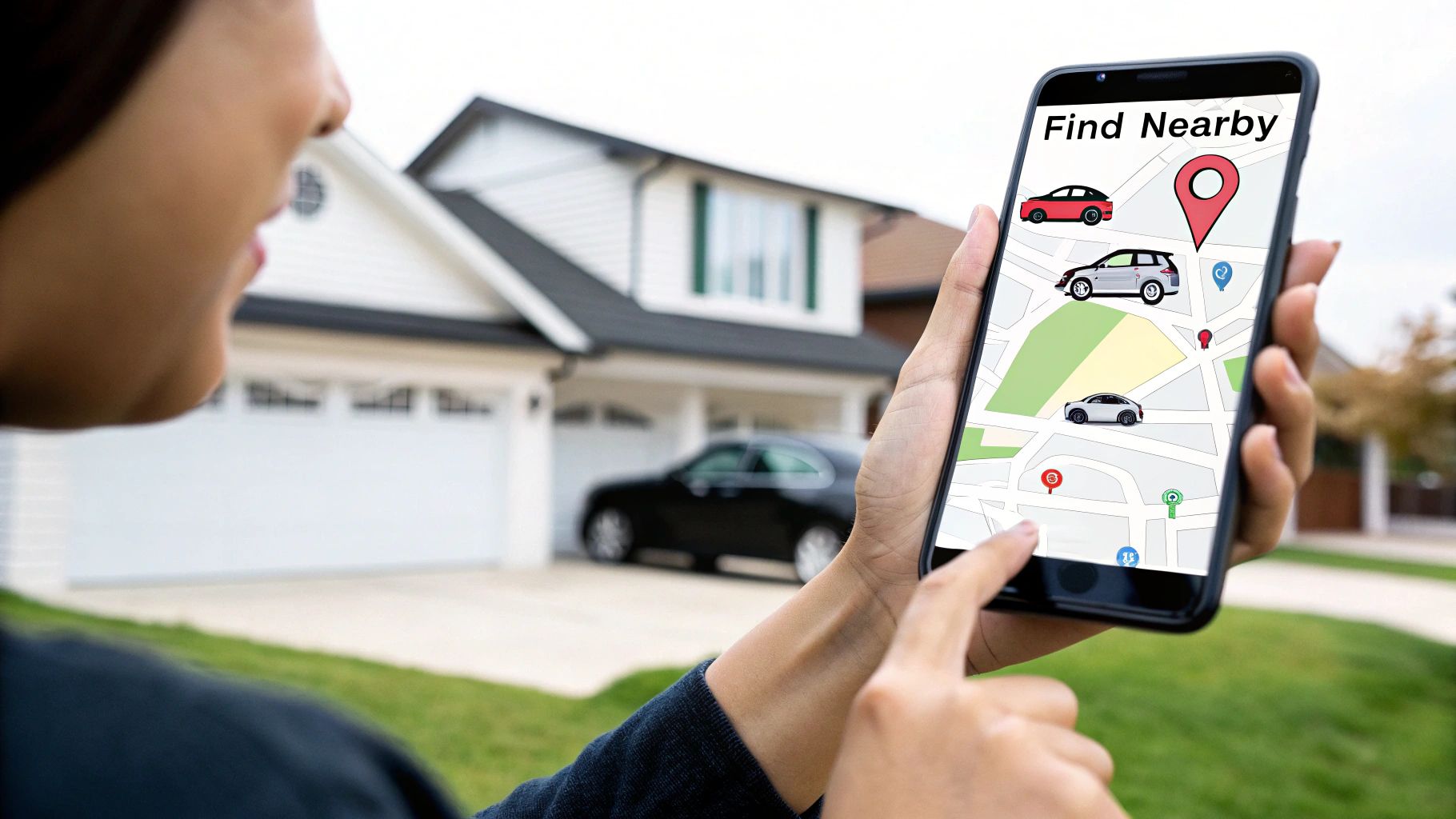
Go ahead and search for "auto wreckers near me"—you'll be met with a flood of options. But here’s the thing I’ve learned from years in this industry: not all of them play by the same rules. Spending a bit of time checking out who you’re dealing with is the single best thing you can do to get a fair price and avoid a major headache.
A trustworthy operator won't have anything to hide. Start by having a quick look at their website. Does it look professional? Can you easily find a physical, local address? Be very cautious of any outfit that only lists a mobile number. It’s a classic red flag that separates the established local businesses from the fly-by-nighters.
The Power of Reviews and a Good First Impression
Next, it’s time to see what other people are saying. Google Reviews are invaluable here. Don’t just glance at the star rating; dive into the actual comments and look for consistent themes. Are customers happy with the service? Did the company show up on time and pay the price they quoted?
On the flip side, watch out for complaints about drivers trying to haggle the price down on arrival or being unreliable. A few bad reviews happen, but pay close attention to how the business responds. It speaks volumes about their commitment to customer service.
A good car recycler has built their business on reputation and word-of-mouth. When you see a pattern of happy customers praising a company’s fairness and efficiency, you know you’re on the right track.
This simple bit of homework helps you build a solid shortlist, so when you start making calls, you’re already dealing with companies that have passed the initial sniff test.
Key Questions to Ask a Car Recycler
Once you have a few potential recyclers lined up, it’s time to make some calls. To avoid any nasty surprises, you need to ask more than just, "How much can I get for my car?"
This checklist is your best friend when calling around. Use it to compare different services and make sure you’re dealing with a legitimate, transparent company.
Key Questions to Ask a Car Recycler
| Question | What a Good Answer Looks Like | Red Flag |
|---|---|---|
| Is the towing completely free? | "Yes, our towing is 100% free within our service area, with no conditions." | "It depends," or any hesitation about your location or the car's condition. |
| Are there any hidden fees at all? | "No, the price we quote is the exact amount you'll receive. There are no admin or collection fees." | Vague answers or mentions of "potential" environmental or processing charges. |
| What kind of paperwork do you provide? | "We’ll give you an official receipt or a vehicle transfer form as proof of disposal." | "Don't worry about it," or any suggestion that paperwork isn't necessary. |
| How and when do I get paid? | "We pay cash on the spot when we pick up the car," or, "We can do an instant bank transfer." | "We'll send a cheque later," or any payment method that involves a delay. |
Asking these questions upfront ensures everyone is on the same page and protects you from dodgy tactics.
It’s also worth remembering that recycling standards vary quite a bit across the country. South Australia, for example, is a leader with a material recovery rate of around 78.1%, while the Northern Territory sits much lower at 18.2%. While metals generally have a high national recovery rate (87%), these regional stats highlight why choosing an established recycler who follows best practices really matters.
Finding the right partner gives you more than just cash—it gives you peace of mind. For a deeper dive into finding the best local options, our guide to reliable auto wreckers near me has more tips to help you out.
Navigating the Necessary Paperwork
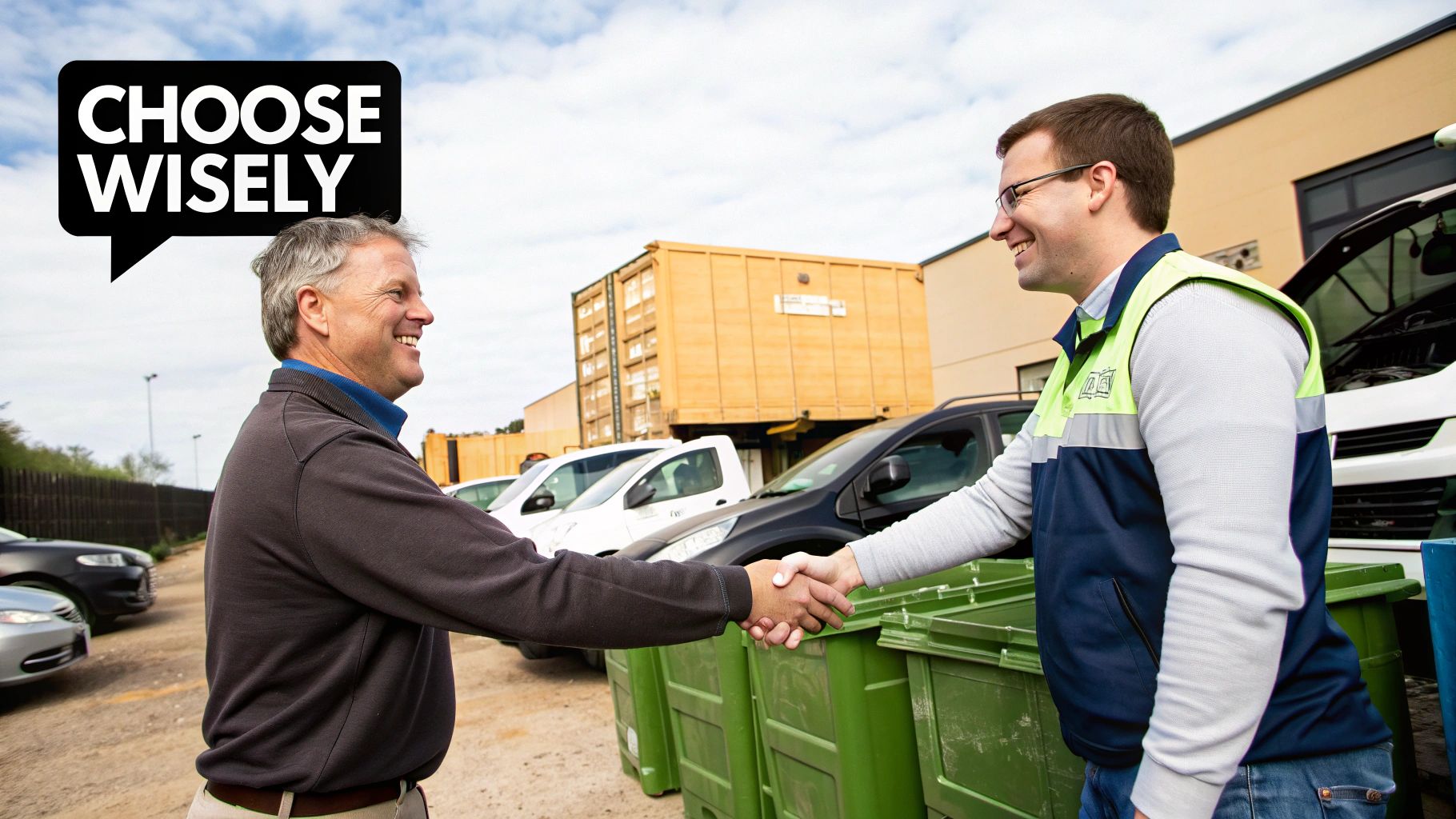
Let's be honest, paperwork is nobody's favourite task. But when it comes to scrapping your car, getting it right is crucial, and thankfully, it's usually more straightforward than you might think.
The whole point of the documentation is to prove one simple thing: that you are the car's legal owner. A reputable recycler needs this guarantee before they can legally take your car and start breaking it down. This simple check protects them—and you—from the serious legal mess of accidentally handling a stolen vehicle.
For most car recycling jobs in Australia, you’ll only need a couple of key documents to get everything sorted.
Your Essential Document Checklist
Having your documents ready to go when the tow truck arrives makes the whole handover process a breeze. It shows the recycler you’re organised and helps them tick off their own legal boxes quickly.
- Proof of Ownership: This is your vehicle's registration certificate or title. It holds all the key information, like the VIN and your name as the registered owner.
- Photo Identification: A current Australian driver's licence is the gold standard here. The name on your licence absolutely must match the name on the car's registration.
If you can't find your registration certificate, don't stress. Many recyclers have ways to verify ownership through official databases using your licence and the car's details. The key is to mention this upfront when you call for a quote so they can let you know their procedure.
The most important piece of paper you’ll get is the disposal certificate or transfer receipt from the recycler. This is your legal proof that the car is no longer your responsibility. Never let them take your vehicle without getting this document in your hands first.
State-Specific Considerations
While the basic requirements are pretty much the same everywhere, you might find slight differences in the paperwork depending on your state. The official name of a form or the exact process for notifying the transport authority can vary between South Australia, New South Wales, and Victoria.
Any professional auto recycler will know the local regulations inside and out. They'll give you the right forms and tell you exactly what to sign. This paperwork is your shield against any future problems, like stray traffic fines or toll notices that could pop up later.
For a deeper dive into the specifics, our guide on the complete disposal of cars has even more detail.
How We Figure Out What Your Scrap Car Is Worth
Ever wondered how we turn that old car sitting in your driveway into a specific cash offer? It’s not just a random number we pull out of thin air. It’s a careful assessment based on a few key things that tell us what your car is really worth in today's market. Understanding this helps you see your car less like junk and more like a collection of valuable resources.
The biggest factor, hands down, is your car’s kerb weight. Most of a car is steel, and scrap steel prices fluctuate daily, just like any other global commodity. It's simple, really: a heavier vehicle like a 4WD or a ute has a lot more metal than a small hatchback, and that extra weight directly translates to a higher base value. We're essentially buying it by the kilogram.
It's More Than Just a Number on the Scales
While weight gives us a starting point, your car's make, model, and age also play a huge part. We see a much higher demand for spare parts from popular models, which can seriously boost your offer.
For example, a 10-year-old Toyota Corolla likely has more valuable salvageable components than a 25-year-old car from an obscure brand. Why? Because there are still thousands of those Corollas on the road, and people are always looking for affordable parts to keep them running.
Your car's value isn't just in its raw metal. It's also in the sum of its working parts. A vehicle that was running before it was parked for good is almost always worth more than one with a seized engine.
Uncovering the Hidden Value in Salvageable Parts
This is where you'll often see the biggest difference between quotes from different recyclers. An experienced eye knows how to spot the high-value components that can be pulled out, tested, and resold. These parts can add some serious dollars to your final price.
- Engine and Transmission: These are the big-ticket items. If they’re still in good working order, they are by far the most valuable parts in the entire car.
- Catalytic Converter: This little box contains precious metals like platinum and palladium, making it a hot commodity for recycling.
- Alternators and Starter Motors: These are common failure points on older cars, so there’s always a steady demand for functional, second-hand units.
- Body Panels and Wheels: Straight, undamaged doors, bonnets, and alloy wheels can also be salvaged and find a new home on another vehicle.
Even the non-metal bits have a role to play. The push for a circular economy is gaining real momentum, and the Australian waste plastic recycling market is a perfect example. Valued at USD 1.2 billion in 2024, this sector is getting better and better at recovering and reusing materials from cars, like bumpers and dashboards. You can dig deeper into the growth of Australia's plastic recycling market to see how this is helping create a more sustainable auto industry.
Want a solid idea of what your specific vehicle might be worth before you even pick up the phone? Using an online tool is the perfect way to get a baseline figure. For a quick, no-fuss estimate, our junk car value calculator is a great place to start.
Common Questions About Car Recycling in Australia
Even with the best plan, there are always a few lingering questions when it’s time to finally say goodbye to your old car. It’s perfectly normal to feel a bit uncertain, so think of this section as a quick chat to clear up those last-minute details. We'll give you straight, no-nonsense answers to the questions we hear every day.
Can I Recycle a Car Without Keys or Rego Papers?
This is easily the most common question we get, and the short answer is yes, you almost certainly can. Having the registration papers definitely makes everything smoother, but it's not a dealbreaker if you can't find them. The most important thing is proving you're the legal owner.
You’ll just need to provide another form of proof, like your driver’s licence. The name on your licence must match the name the car is registered under. The recycler will use this to verify your ownership through official channels, which is a crucial step to protect everyone involved.
Losing the keys is another frequent issue. Just be sure to mention it when you call around for quotes. Professional tow truck drivers are well-equipped to handle cars without keys, but they need a heads-up to bring the right gear. It rarely affects your quote, but it does ensure the pickup goes off without a hitch.
How Much Cash Can I Realistically Expect?
The amount of cash you'll get for your scrap car can swing quite a bit. It all comes down to a few key things: the car's weight, its make and model, and, crucially, the current market price for scrap metal, which can change daily.
It makes sense that a small hatchback will be worth less than a big 4WD—it’s just a matter of how much metal is there. To give you a ballpark figure, a smaller, older car with not much left to salvage might get you around $150 to $250. On the other hand, a heavier vehicle or one with parts that are in high demand (like a working transmission or a clean engine) could fetch $1000 or even more.
Your final offer is a direct reflection of your vehicle's value in the current recycling market. Getting at least three different quotes is the best way to ensure you're receiving a fair and competitive price for what your car is worth on that specific day.
Don't forget, the recycler is also looking at what components they can salvage. A straight, undamaged door or a working alternator adds real value to their business, which can push your quote well above the basic scrap metal price.
What Happens to My Car After It Gets Picked Up?
Once your car is on the back of that tow truck, it starts its new life in the circular economy. The whole process is incredibly organised and designed to recover every last bit of usable material. It’s a lot more sophisticated than just chucking it into a crusher.
Here’s a look at the typical journey your old car will take:
- Depollution: The first stop is the draining station. Here, all hazardous fluids—oil, petrol, coolant, brake fluid—are carefully removed. The battery and any mercury switches are also taken out for specialist recycling.
- Dismantling: Next, skilled technicians go over the vehicle to salvage any parts that can be reused. This includes everything from engines and alternators to seats and mirrors. These parts are then cleaned, tested, and resold to mechanics and the public.
- Shredding and Sorting: The remaining shell of the car, often called the "hulk," is then fed into a massive shredder. This machine tears it into fist-sized pieces of metal in just a few moments.
- Material Separation: From there, the shredded bits are passed through a system of powerful magnets and other clever sorting technologies. Ferrous metals like steel are pulled out, while non-ferrous metals like aluminium and copper are separated for their own recycling streams.
These raw materials are then sold to smelters and mills, ready to be melted down and turned into new products. Thanks to this highly efficient process, over 80% of your old car by weight gets a second life, saving a huge amount of energy and natural resources.
Ready to turn that unwanted car into instant cash? The team at Auto Removal Adelaide offers top-dollar quotes and free, same-day vehicle removal across the Adelaide area. We make the entire process simple and transparent, handling all the paperwork for you. Get Your Free Quote Today and see how much your car is worth.

